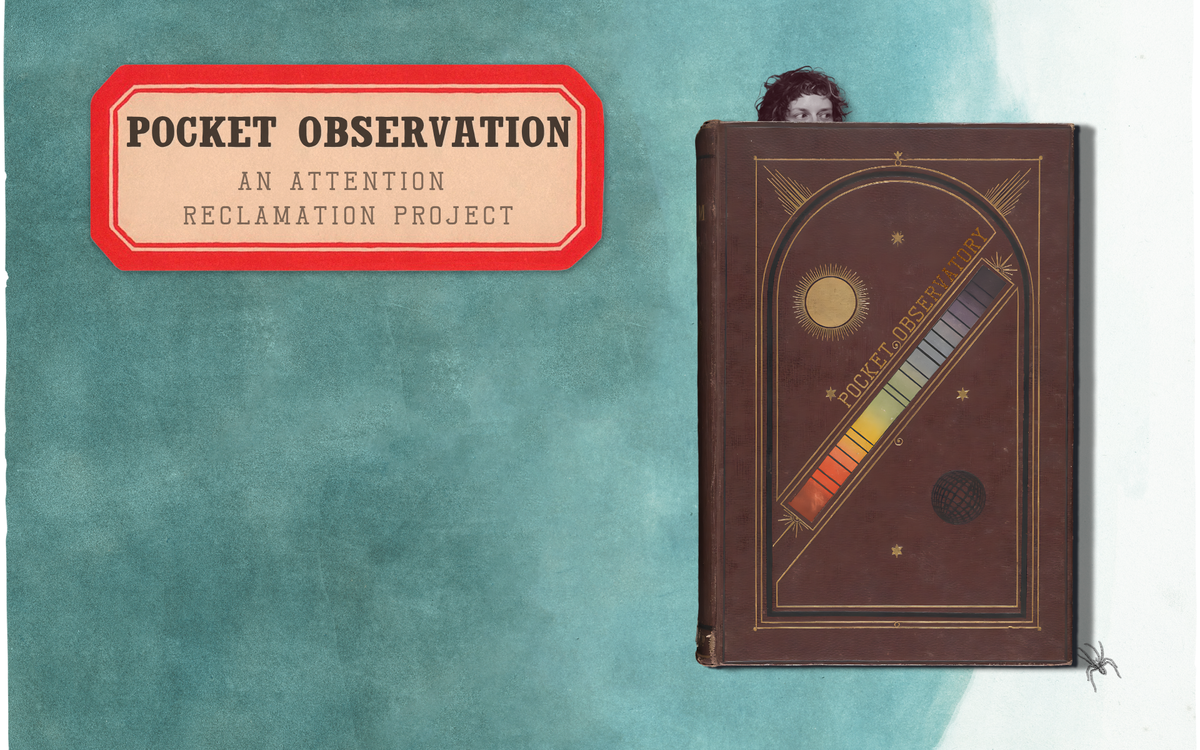Pocket Observation
An Attention Reclamation Project

First What and Then Why
What
Paid Pocket Observatory members can become a part of Pocket Observation, an attention reclamation project. They can also contribute their own observations to The Observatoreum.
Directed monthly observations + access to exclusive writing
Each month I send out a Pocket Observance, a series of prompts designed to help you sit down and think beyond algorithms, headlines, and the mono-narratives of the powerful.
Pocket Observances are specific, quirky, curious. They cover current events, interior lives, exterior walls, design, science, politics, technology, etc. There will also be prompts related to things Western cultures stopped formally observing during the Great Enlightenment. Let's get metaphysical.
Each person approaches the monthly observance differently. Often ruminating on the month's observance is enough! Sometimes, they record their observations through writing, images, audio. I encourage each person to create an archive of their recorded observations for themselves, their family, the people who come next. Each archive preserves human knowing and human experience. I think that's really special – and increasingly vital.
Pocket Observatory members receive my own Pocket Observations each month in exclusive letters.
I also put each of my observations into The Observatoreum, where they interact with other Objects.
Would you like to see how your own observations interact with other Objects in the Observatoreum?
Paid members can submit their observations anonymously each month. They are helping to keep information without keeping it for themselves. I think that’s really generous.
Why
Our attention is being mined by algorithms and AI bots. Information is becoming an increasingly exploited resource. I feel compelled to do what I can to protect both. I think most of us have a working definition of attention. But information is a wiggly word. So let’s define it. I mean information as Michael Buckland discusses it in Information And Society, information as “related to human knowing and everyday experience.”
The traditional pathways we’ve used to share human knowing have been disrupted. At first, this seemed very good. Traditional pathways often begin behind large gates. Transmission technology like railways, telephone and the internet made it possible for people to access ways of knowing they’d have been denied in another time and place.
I am a very good example of how accessible knowledge can transform a person. I was raised to become a Mormon housewife. And I did become one. I had a lot of experience inside the home. The human knowing I possessed had to do with care work in a very restricted context.
And then, voices on Twitter helped me access other kinds of human knowing. They helped me find Plato and Planck, Baldwin and Beard, Gouges and Gödel. I’ve always written. But I became an independent researcher because of the internet. And now I can’t find the most basic answers to the most basic queries. Everything is AI-generated slop.
This has been coming for a long time.
The interests that would destroy the internet of knowledge were gathering before I knew there was an online. The US government complied at every turn. Deregulation, market fundamentalism, and vertical consolidation produced the oligarchs who would keep information from people. The impacts are already all around us.
Local journalism has been destroyed by private equity. Community spaces have been deconstructed and replaced with algorithmic platforms. If you’ve used Google or Twitter/X recently, you know that the disruptive technology is now undergoing controlled demolition. They’ve realized there isn’t enough profit in facilitating knowledge-sharing.
Now that the disrupters are disrupting themselves, we’ve got little to no cultural or technological for keeping and dispersing information. I won’t pretend I know how to fix it all from my kitchen table. I just know that we’ve got to preserve as much information as we can - for ourselves, for others. Preservation is not the same as hoarding. We’ve got to find a way to keep information without keeping it for ourselves. And dispersing is not the same as distribution. Dispersing allows different people to arrive at different ways of knowing at different times, in different ways.
Pocket Observation is how I am going to keep without keeping, disperse without distributing. This project is limited, because I am limited. But I am doing what I can to expand myself and this space. When you share your observations here, you help disperse information.
Much more importantly, a monthly practice of observance helps you understand how to keep without keeping, in your own context. That’s a way of knowing you must ultimately arrive at on your own. But I am here to help you get there, in my own little way.
